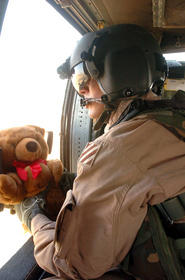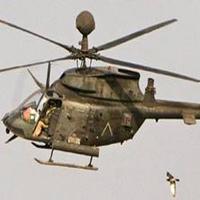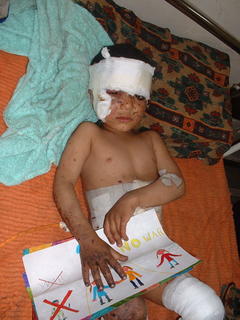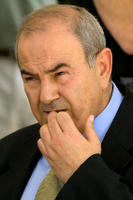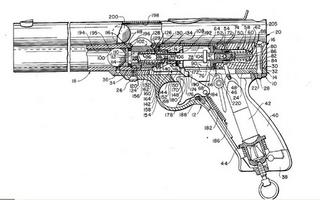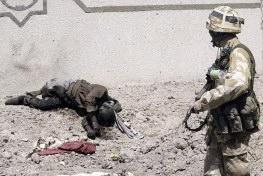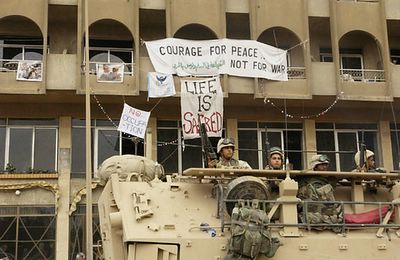 Tomgram: The Immoral Relativists of the Bush Administration
Tomgram: The Immoral Relativists of the Bush Administration
by Tom Engelhardt, who runs the Nation Institute's Tomdispatch.com (Images were added)
"At a breakfast meeting with reporters, Wolfowitz said he hasn't read the [Downing Street] memos because he doesn't want to be ‘distracted' by ‘history' from his new job as head of the world's leading development bank. He returned this weekend from a tour of four African nations.
 "'There's a lot I could say about what you're asking about, if I were willing to get distracted from the main subject,' Wolfowitz said. ‘But I really think there's a price paid with the people I've just spent time with, people who are struggling with very real problems, to keep going back in history.'" (Jon Sawyer, Wolfowitz won't talk about war planning, St. Louis Post-Dispatch.)
"'There's a lot I could say about what you're asking about, if I were willing to get distracted from the main subject,' Wolfowitz said. ‘But I really think there's a price paid with the people I've just spent time with, people who are struggling with very real problems, to keep going back in history.'" (Jon Sawyer, Wolfowitz won't talk about war planning, St. Louis Post-Dispatch.)
For at least 30 years now, the right has fought against, the Republican Party has run against, and more recently, the Bush administration has claimed victory over the "moral relativism" of liberals, the permissive parenting of the let-them-do-anything-they-please era, and the self-indulgent, self-absorbed, make-your-own-world attitude of the Sixties. Since September 11th, we have been told again and again, we are in a different world... finally. In this new world, things are black and white, good and evil, right and wrong. You are for or you are against. The murky relativism of the recent past, of an America in a mood of defeat, is long gone. In the White House, we have a stand-up guy so unlike the last president, that draft dodger who was ready to parse the meaning of "is" and twist the world to his unnatural desires.
In his speeches, George Bush regularly calls for a return to or the reinforcement of traditional, even eternal, family values and emphasizes the importance of personal "accountability" for our children as well as ourselves. ("The culture of America is changing from one that has said, if it feels good, do it, and if you've got a problem, blame somebody else, to a new culture in which each of us understands we are responsible for the decisions we make in life.") And yet when it comes to acts that are clearly wrong in this world -- aggressive war, the looting of resources, torture, personal gain at the expense of others, lying, and manipulation among other matters -- Bush and his top officials never hesitate to redefine reality to suit their needs. When faced with matters long defined in everyday life in terms of right and wrong, they simply reach for their dictionaries.

You want to invade a country not about to attack you. No problem, just pick up that Webster's and rename the act "preventive war." Now, you want an excuse for such a war that might actually panic the public into backing it. So you begin to place mushroom clouds from nonexistent enemy atomic warheads over American cities (
Condoleezza Rice: "[W]e don't want the smoking gun to be a mushroom cloud."); you begin to claim, as our President and other top officials did, that
nonexistent enemy UAVs (Unmanned Airborne Vehicles) launched from nonexistent ships off our perfectly real East coast, might spray nonexistent biological or chemical weapons hundreds of miles inland, and -- Voila! -- you're ready to strike back.
You sweep opponents up on a battlefield, but you don't want to call them prisoners of war or deal with them by the established rules of warfare. No problem, just grab that dictionary and label them "unlawful combatants," then you can do anything you want.
So you get those prisoners into your jail complex (carefully located on an American base in Cuba, which you have redefined as being legally under "Cuban sovereignty," so that no American court can touch them); and then you declare that, not being prisoners of war, they do not fall under the Geneva Conventions, though you will treat them (sort of) as if they did and, whatever happens, you will not actually torture them, though you plan to take those "gloves" off. Then your lawyers and attorneys retire to some White House or Justice Department office and, under the guidance of White House Counsel Alberto Gonzales (now Attorney General), they grab those dictionaries again and redefine torture to be whatever we're not doing to the prisoners. (In
a 50-page memo written in August 2002 for the CIA and addressed to Alberto Gonzales, Assistant Attorney General Jay S. Bybee, now an Appeals Court judge, hauled out many dictionaries and redefined torture this way: "must be equivalent in intensity to the pain accompanying serious physical injury, such as organ failure, impairment of bodily function, or even death.") And if questioned on the subject, after emails from FBI observers at the prison lay out the various acts of abuse and torture committed in grisly detail, the Vice President simply insists, as he did the other day, that those prisoners are living the good life in
the balmy "tropics." ("They're well fed. They've got everything they could possibly want. There isn't any other nation in the world that would treat people who were determined to kill Americans the way we're treating these people.")
Women and Children Last
What the Bush administration has proved is that, if you have a mind to do so, there's no end to the ways you can define "is." No administration has reached not just for its guns but for its dictionaries more often, when brought up against commonly accepted definitions of what is.
Why just the other day, faced with a downward spiraling situation in Iraq and plummeting

public-opinion polls, Vice President Cheney went on
Larry King Live and declared that the Iraqi insurgency was actually in its "last throes." In this case, he had perhaps reached for his dictionary a little too fast. The phrase was taken up and widely questioned. So Cheney who, as Juan Cole reminds us, claimed he "'knew where exactly' Saddam's alleged weapons of mass destruction were and who was sure Iraqis would deliriously greet the U.S. military as liberators," simply returned to the administration's definitional stockpile. When asked by
CNN's Wolf Blitzer whether General John Abizaid's description of the Iraqi situation -- that the insurgency was "undiminished" (with ever more foreign fighters entering Iraq) -- didn't contradict his, he responded:
"No, I would disagree. If you look at what the dictionary says about throes, it can still be a violent period -- the throes of a revolution. The point would be that the conflict will be intense, but it's intense because the terrorists understand if we're successful at accomplishing our objective, standing up a democracy in Iraq, that that's a huge defeat for them. They'll do everything they can to stop it."
Actually, according to my own patriotically correctly named and so indisputable reference book, The American Heritage Dictionary of the English Language, a "throe" is "a severe pang or spasm of pain, as in childbirth," and the "throes" of a country in, say, revolution or economic collapse would also be brief spasms. Of course, just the other day, Secretary of Defense Donald Rumsfeld, looking into his murky crystal ball, claimed that this "spasm"
could last up to another 12 years. I suppose from now on we should all speak of that period from birth to death as the "throes of life." As it happens, the
American people seem uncomfortable with our Vice President's latest definitional forays. (For more on defining "throes," I turn you over
to the indefatigable Juan Cole.)
Here's the strange thing, then: No one in our lifetime has found the nature of reality to be more definitionally supple, more malleable, more… let's say it… postmodern and relative (to their needs and desires) than the top officials of the Bush administration.
Their watchwords might be defined, if you don't mind my reaching for my dictionary of sayings, as -- batten down the definitional hatches, full speed ahead, and if you hit a mine, women and children last. In that way, they have redefined "accountability" as never having to say you're sorry; or, as then-Governor of Texas evidently put it to the man
ghostwriting his campaign autobiography in 1999, "...as a leader, you can never admit to a mistake"; or as former Undersecretary of Defense Paul Wolfowitz put it when telling reporters he hadn't bothered to read the Downing Street Memos, you shouldn't let yourself be "distracted" by messy old "history." In the Bush administration, accountability has largely meant
promotion.
Let's throw in just a few other moments of high Bush postmodernism: No administration in memory has been quicker to lie in its own interests and never stop doing so, no matter what. (For instance, to this day
the President never ceases to push the absurd link between the war in

Iraq and the September 11th attacks). None in recent memory has been quicker to lie about or smear its opponents, or had, in political hand-to-hand combat, a nastier, sometimes filthier mouth,
publicly (as Karl Rove proved in recent statements) or
privately. None has, in fact, seemed to care less about any of the moral categories of behavior it was ostensibly promoting, when those happened to run aground on the shoals of its own political desires and fantasies.
A Five-Star Rendition and Other Acts of Relativity
Every administration sets a mood. You can see the one this administration has established reflected way down the line -- in, for example, the depths of Abu Ghraib's interrogation chambers. As it happens, you can also catch a glimpse of it in five-star Italian hotels. The other day, Stephen Grey and Don Van Natta of the New York Times reported (
Thirteen With the C.I.A. Sought by Italy in a Kidnapping) that an Italian judge had ordered the arrest of 13 American agents, assumedly working for the CIA, for performing an "extraordinary rendition" in Italy. They kidnapped an Egyptian cleric named Hassan Mustafa Osama Nasr, who may or may not have been linked al-Qaeda, and flew him to Egypt to be tortured. Now, you may imagine that our "shadow warriors," operating in the dark zone of international illegality in the name of our President's Global War on Terror, are Spartan men and women, stripped down for action, ready to sacrifice everything for missions they believe in. You undoubtedly assume that, while in Italy, they laid low, bunking in safe houses, while organizing their covert kidnapping. But wait, these are representatives of the Bush administration, so think again. Here was a paragraph buried deep in the Times piece that caught my eye:
"The [CIA] suspects stayed in five-star Milan hotels, including the Hilton, the Sheraton, the Galia and Principe di Savoia, in the week before the operation, at a cost of $144,984, the [Italian] warrant says, adding that after Mr. Nasr was flown to Egypt, two of the officers took a few days' holiday at five-star hotels in Venice, Tuscany and South Tyrol."
A
Washington Post report added this little detail: "The Americans stayed at some of the finest hotels in Milan, sometimes for as long as six weeks, ringing up tabs of as much as $500 a day on Diners Club accounts created to match their recently forged identities." The
Los Angeles Times contributed the fact that the $145,000 tab actually only covered accommodations. As it happens, our luxury warriors were gourmets as well. They ran up tabs at Milan's best restaurants.
All of this fits so well with general attitudes at the upper reaches of this self-indulgent administration. Ours is, after all, a war to satisfy our own desires, to make the world the way we wish it -- and who wouldn't wish for luxury surroundings and a nice five-star, post-kidnapping vacation in Venice or Florence, all at the taxpayer's expense? (I guarantee, by the way, that our agents also ate all the macadamia nuts and drank all the liquor and downed all the $10 cokes in their mini-fridges.) And yet you can rest assured that no one in this administration is going to demand repayment. In fact, no one has even whispered a word about these expenses so far, no less promised taxpayers our money back, but you wouldn't expect that from an administration that stonewalls for a corporation,
Halliburton, which seems to have taken both the American taxpayer and the Iraqis
to the five-star cleaners. And while we're at it, let's just note that our rendition teams circle the world not on some scruffy cargo plane, but on a Gulfstream V turbojet, the sort "favored by CEOs and celebrities,"
as Dana Priest of the Washington Post puts it. This is the mentality not of warriors, of course, but of looters who never saw a payoff or an opening they didn't exploit.
From top to bottom, Bush's people are, in this sense, a caricature of their own caricature of the 1960s. In fact, given their fixation on the Sixties, it's worth revisiting their record in that long-ago era when they were already the most morally relative of beings. On the central issue of those years, the Vietnam War, they were
essentially missing in action; or, as our Vice President
so famously commented, "I had other priorities in the '60s than military service." The striking thing about the record of most of the Bush administration's key players (and almost all of the neocons) was that they used privilege, legalistic tricks, and every bit of slyness they could muster to avoid any entanglement with Vietnam (on any side of the issue) and later on, coming to power, they had not the slightest compunction about wrapping themselves in the flag and the uniform, acting like the warriors they never were, and attacking those who had engaged in some fashion with the Vietnam War.
It is perhaps not an irony but a kind of inevitability that, having worked so hard to avoid Vietnam (and its "mistakes") all those years, they now find themselves tightly gripped by a situation of their own making that has a remarkably Vietnam-like look to it; and, worse yet, they find themselves acting as if they were now, after all these years, back in the 1960s fighting the War in Vietnam rather than the one in Iraq. In his testimony before the Senate last week,

Donald Rumsfeld even managed to get the classic Vietnam word "quagmire" and the equivalent of "light at the end of the tunnel"
into a single sentence: "There isn't a person at this table who agrees with you [Senator Ted Kennedy] that we're in a quagmire and there's no end in sight."
As a group, the top figures in this administration have often seemed like so many aggressive children let loose in the neighborhood sandbox by deadbeat dads and moms. Does nobody wonder where those mommies and daddies, the people who should have taught them right from wrong, actually went? Certainly, their children are, in the best Sixties manner, all libido. Let me, in fact, suggest a label for them that, I hope, catches their truest political nature: They are immoral relativists.
Yet, even for the most self-absorbed among them, the ones most ready to twist reality (and the names we give it) into whatever shape best suits their needs of the moment, reality does have a way of biting back. Count on it.
Tom Engelhardt, who runs the Nation Institute's Tomdispatch.com ("a regular antidote to the mainstream media"), is the co-founder of
the American Empire Project and the author of
The End of Victory Culture, a history of American triumphalism in the Cold War.
[Special thanks go to Nick Turse for his invaluable research aid.]
Copyright 2005 Tom Engelhardt













